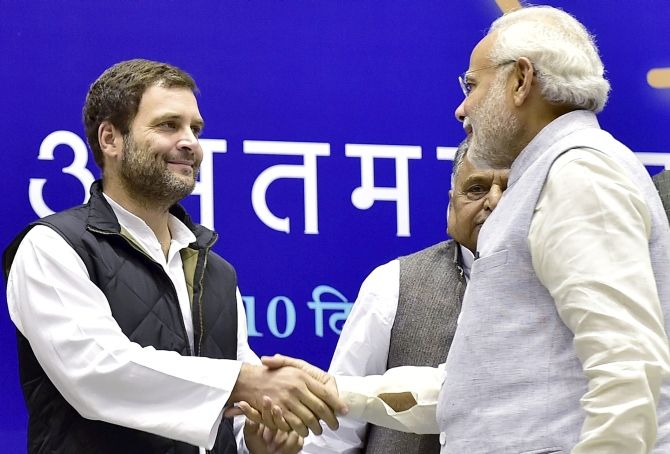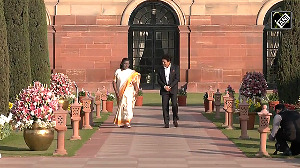'UP, Maharashtra, AP (including Telangana), Tamil Nadu, Rajasthan, MP, Bihar, Karnataka and Kerala.'
'We chose these nine not only as being among the biggest, but also because in these states radical change is possible,' explains Shekhar Gupta.

We know that in politics there are no permanent enemies or friends, only shifting vested interests.
Yet, all political alliances and break-ups, or what the heartland would call 'jod-tod ki rajniti', take place within some broad parameters. These are being redrawn now.
I have had the privilege of learning from three great teachers of Indian politics: Pranab Mukherjee, L K Advani and the late Sitaram Kesri.
I am sure Pranabda wouldn't mind my saying that there isn't a better teacher when it comes to the big picture than L K Advani. Or, to use a description that will be more apt here even if considered cheeky, India's entire political science.
From the late eighties on, when Advani began the resurrection of his party, he would state his simple principle of coalition-building.
"There are five parties that think we are anti-national. Besides these, we are open to aligning with anybody," he would say.
The five 'untouchables' being the Congress, the Left, Mulayam Singh Yadav's Samajwadi Party, Lalu Prasad Yadav's Rashtriya Janata Dal and the Muslim League (including its likes today, Asaduddin Owaisi's Majlis-e-Ittehadul Muslimeen and Badruddin Ajmal's All India United Democratic Front).
It followed that there were parties that had no choice but to align with the Bharartiya Janata Party: The Shiv Sena, Shiromani Akali Dal, and, at that point, the Telugu Desam Party -- the first two, because religion was essential to their politics and power, and the third, because it had no choice, given that the Congress was its only adversary.
He practised what he preached.
The coalition government he confected under Atal Bihari Vajpayee was the first to complete its full term.
It took away India's phobia of coalitions and weakened the TINA (There Is No Alternative) factor.
Until then, you'd smirk or shrink in fright each time George Fernandes would say why can't coalitions work in India if they can flourish in the 'mother-in-law's country' (Italy).
Subsequently, even that 'daughter of Italy' built a coalition that lasted full terms.
The essential parameters, however, did not change: There were parties you would never go with, there were others who had no choice but to be with you.
Further, in any election, between 75 and 150 seats were bound to go to parties with ideologies fungible with power.
This is what made about 160 the new 272. This is now changing, but not in a manner you might have expected after Narendra Damodardas Modi's BJP won a full majority in 2014.
Pointers today indicate a return to the pre-2014 situation, but with a twist.
It is most unlikely, on what economists would call a ceteris paribus (all other things being equal) basis, that any party would get a majority now.
Not even the most committed BJP loyalists boast of a likely majority.
Their best argument is, definitely 230-plus, and even if a few less, aur kaun hai (who else is there)?
This, is back to the post-1989 normal, but not quite the same way.
Why does Rahul Gandhi send a 'best wishes to Shri Uddhav Thackeray ji, on his birthday. I wish him good health and happiness always' tweet?
Hypocrisy is least likely to bother politicians and there is no story in wishing your adversary on a birthday.
Or when you are even happy to go down and surprise your biggest adversary with a hug. But this is different.
Never has a Congress chief sent out greetings, and that too for in public, to the supremo of the party that represents values ideologically most abhorrent to it.
The Shiv Sena is even more untouchable for the Congress than the BJP, the reason it's been the most essential ally in the National Democratic Alliance.
If Rahul now reaches out to its chief and makes his 'love-note' public, it means three things -- one, that he sees a crack in BJP-Sena ties and is jubilantly feeling it with a dagger; two, that he is clearer on his 2019 strategy: Anybody but Modi, even if it isn't me; and three, that even if India returns to coalitions in 2019, its politics is breaking out of the old parameters of alliance-making drawn by Advani.
That the enemy's enemy is your friend is the oldest truism in love, war and politics.
If you are now willing to reach out to your enemy's best friend, it shows that to defeat one you dislike more you can hug the other.
You are facing an existentialist challenge to your party, family and to what you think should be protected as the idea of India.
So new rules can be written. Ideological niceties can wait.
The diminished prospect of a repeat Modi majority has also restored our earlier, best-of-nine-sets-tennis-match theory of who would rule India.
Any side that wins five of these will rule India.
The nine 'sets' here have been Uttar Pradesh, Maharashtra, Andhra Pradesh (including Telangana), Tamil Nadu, Rajasthan, Madhya Pradesh, Bihar, Karnataka and Kerala.
We chose these nine not only as being among the biggest, but also because in these states radical change is possible. That is why we left out Odisha, West Bengal and Gujarat.
The nine states among them hold 351 Lok Sabha seats. The coalition winning five is most likely to be close to 200, and definitely upwards of 160.
That, as we said earlier, was the 272, until 2014. We could be getting back to that.
See it from the point of view of someone (Rahul) whose foremost objective is to deny the Modi-Shah BJP another term.
If the SP and Bahujan Samaj Party stay together, the BJP is definitely not sweeping Uttar Pradesh. It will struggle to reach half of its 2014 tally of 73.
It is bound to suffer attrition in Rajasthan, Madhya Pradesh and Haryana where it maxed out in 2014.
It hopes to make up in the east and north east.
Its priority, therefore, is to keep its hold on Maharashtra, the state with the largest contribution to the Lok Sabha (48) after Uttar Pradesh.
Amit Shah has lately made brave calls, rallying his troops to fight Maharashtra alone, without the Sena. But he knows he cannot sweep it without the Shiv Sena.
Rahul too knows this.
If 2019 is back to being a best of nine sets again, then he must deny Maharashtra to the BJP/NDA. No one is so naive as to suggest that the Shiv Sena will join an alliance with the Congress/United Progressive Alliance.
But Rahul doesn't even need that.
If the Shiv Sena only stays out of the NDA, his objective is mostly achieved.
As for unstated electoral adjustments, the Congress and Sharad Pawar are masters at that.
That is the political translation of that 'Happy Birthday Uddhav ji' message.
Play the prime minister's reply to the no-confidence motion again and you might spot a most important takeaway: His flattering compliments to K Chandrashekar Rao as Telangana's 'Vikas Purush', unlike sulking Chandrababu Naidu in Andhra.
KCR, you'd remember, has been trying to build an anti-BJP federal front with other regional leaders.
If Modi can reach out to him, to breach Andhra-Telangana, and Rahul to Uddhav Thackeray, you can safely infer that this is now an open election.
By Special Arrangement with The Print












 © 2025
© 2025